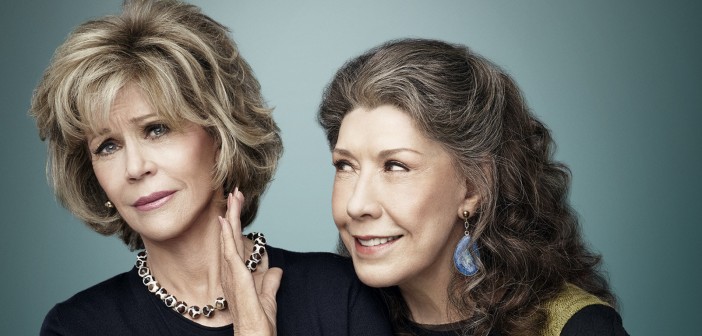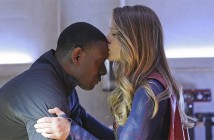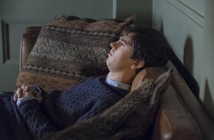Grace and Frankie came to Netflix on Friday. The show tells the story of Grace (Jane Fonda) and Frankie (Lily Tomlin), two women who go from acquaintances to good friends after their husbands leave them for each other. Although the lead ladies are the stars of the show, it’s also an ensemble about family.
I was immediately endeared by Grace and Frankie. It’s assembled a great cast that includes not only veterans like Fonda, Tomlin, Martin Sheen and Sam Waterston, but also always wonderful comedy actors like June Diane Raphael and Baron Vaughn. Its voice and tone are fairly familiar. This is hardly the first show to mine material out of uptight WASP families, liberal hippie families and the contrast between the two. But, at its best, Grace and Frankie did a great job with this material, building an enjoyable show out of little observations about every day life. It feels very earnest and builds very realistic relationships between every combination of characters.
Unfortunately, the show became a lot rockier in the second half. In particular, the last few episodes had some extremely sloppy or cliche scenes and it felt like they were coasting on my goodwill from earlier episodes and attachment to the characters. Scenes like Grace and Frankie dancing on a bar or Sol (Waterston) and Robert (Sheen) getting a giant phallic mechanical bull for their bachelor party felt like transplants from a different kind of show with less respect for its older characters.
From a gay and bisexual representation perspective, I have mixed but overall positive feelings about the show. Sol and Robert, like every character on the show, feel very real and three-dimensional and I thought their relationship had a unique dynamic that I really enjoyed. However, one thing I found odd was that they seem firmly established as being part of a repressed environment– and even outright mention having barely any gay friends– but in the bachelor party episode they suddenly seem to have a horde of the kinds of gay side characters you seem on most TV shows. It’s not that I have a problem with this sort of archetypal gay character, but it didn’t feel like it went along with what the show had established about Sol and Robert’s world. That entire episode felt much more full of cliches than most of the show.
My bigger issue was with the portrayal of Sol’s sexuality. While Robert seems like he’d never had much interest in his wife Grace and was with her because he was supposed to and enjoyed the social status she gave him, Sol’s feelings for Frankie are much more mixed. Early on, I really enjoyed the way they played with the idea that his affair with Robert wasn’t about being a homosexual, but just about having feelings for another person. As the show went on, however, it started to have the tendency so many TV shows these days have where it is pathological afraid of words like ‘bisexual’ or ‘pansexual.’ Sol either refers to himself as gay or vaguely hints that there may be something else going on without really discussing it. In the final episode of the season, he cheats on Robert with Frankie. My frustration with the fact that his bisexuality was only implied was exacerbated by the fact that he played into dangerous stereotypes by being a serial cheater. The writing of his sexuality wasn’t a total dealbreaker for me, there were aspects of it I really enjoyed, but it was frustrating thinking about how much better it could’ve been, especially since strong non-monosexual male characters are so desperately needed in TV.
Despite a few scenes that really made me cringe, overall I enjoyed Grace and Frankie. It’s rare for a TV show to make me so full of affection and investment in every single character. I hope it gets a second season because I genuinely want to see what happens to everyone in this family.




1 Comment
As a bisexual woman, I think your critique of Sol is sort of the point of Sol’s portrayal. A lot of older LGBT community stereotypes discredit the bisexual norm, which can lead to bisexuals feeling the need to prove themselves another way (IE cheating on their partner to figure out if they’re “really” gay). I don’t really know as I’m not that age, but I imagine it would be hard for an older bisexual individual to just stand as themselves when the rest of their peer group is barely getting used to the word “gay.” (and the show portrays this very well, IE the funeral scene).
The presence of Sol in general meant a lot to me. I don’t think it’s perfect, but it portrayed a serious struggle for bi and queer people which usually gets erased.